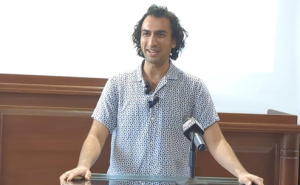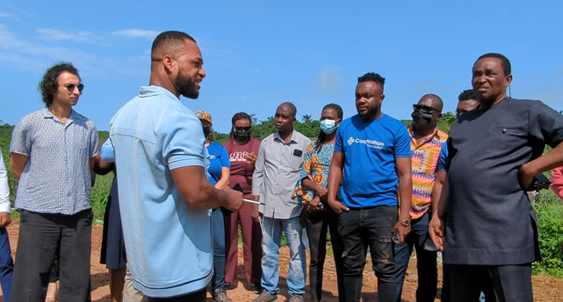By Juliet Aguiar DUGBARTEY
The Sekondi-Takoradi Metropolitan Assembly (STMA) is to tackle the metropolis’ waste management crisis by constructing an integrated bio-digestion and recycling plant.
The project, unveilled during an engagement with a visiting delegation from the C40 Cities Finance Facility (CFF), is expected to significantly cut greenhouse gas emissions, improve sanitation and create jobs for residents.

Metro Chief Executive, lawyer Frederick Faidoo, defined the initiative as a climate-smart pathway that aligns with both Ghana’s national climate agenda and global commitments under the Paris Agreement.
According to him, rapid urbanisation has overwhelmed Sekondi-Takoradi’s waste systems, leaving behind frequent truck breakdowns, limited infrastructure and low community participation.
“The result is irregular collection, indiscriminate dumping and rising health risks including cholera outbreaks,” he said.
Mr. Faidoo singled out the Sofokrom landfill site which lacks a gas collection system as the city’s biggest source of emissions. In 2024 alone, it released an estimated 225,000 metric tonnes of CO₂ equivalent – mainly methane and carbon dioxide from decomposing waste.
The proposed facility, he said, will combine anaerobic bio-digestion turning organic waste into biogas and compost with the recycling of plastics, metals and other materials.
“STMA projects that this could slash emissions to about 90,000 metric tonnes of CO₂ equivalent while producing compost for farmers, jobs for youth and cleaner neighborhoods. This plan is not just a local response but part of Ghana’s climate obligations,” Mr. Faidoo stressed.
“Ghana ratified the Paris Agreement in 2016 and has pledged to cut emissions by 15 percent unconditionally – and up to 45 percent with international support by 2030.”
He called on CFF to partner with STMA in funding and implementing the project.
Yasar Cohen-Shah, Knowledge Officer-C40 Cities Finance Facility, expressed enthusiasm: “We’re very keen on this project. We think it will have substantial impacts on the environment and social welfare of all residents in Sekondi-Takoradi.”
While CFF does not directly provide financing, Mr. Cohen-Shah explained that its role is to make projects bankable through feasibility studies, structuring and linking municipalities with the right financing options, including public-private partnerships and international climate funds.
About the project
The C40 Cities Finance Facility has supported 38 projects across 30 cities in the Global South, cutting more than 7.5 million tonnes of CO₂ emissions and strengthening the resilience of 2.5 million people. Funded by the UK and German governments, the programme is jointly implemented by GIZ and C40 Cities, a global network of mayors fighting climate change.
So far, Accra has been the only Ghanaian city to benefit from a C40-backed waste project. Sekondi-Takoradi’s inclusion is therefore viewed as a milestone poised to draw lessons from Accra while pioneering new approaches to reduce methane emissions, strengthen sanitation and expand green jobs.










